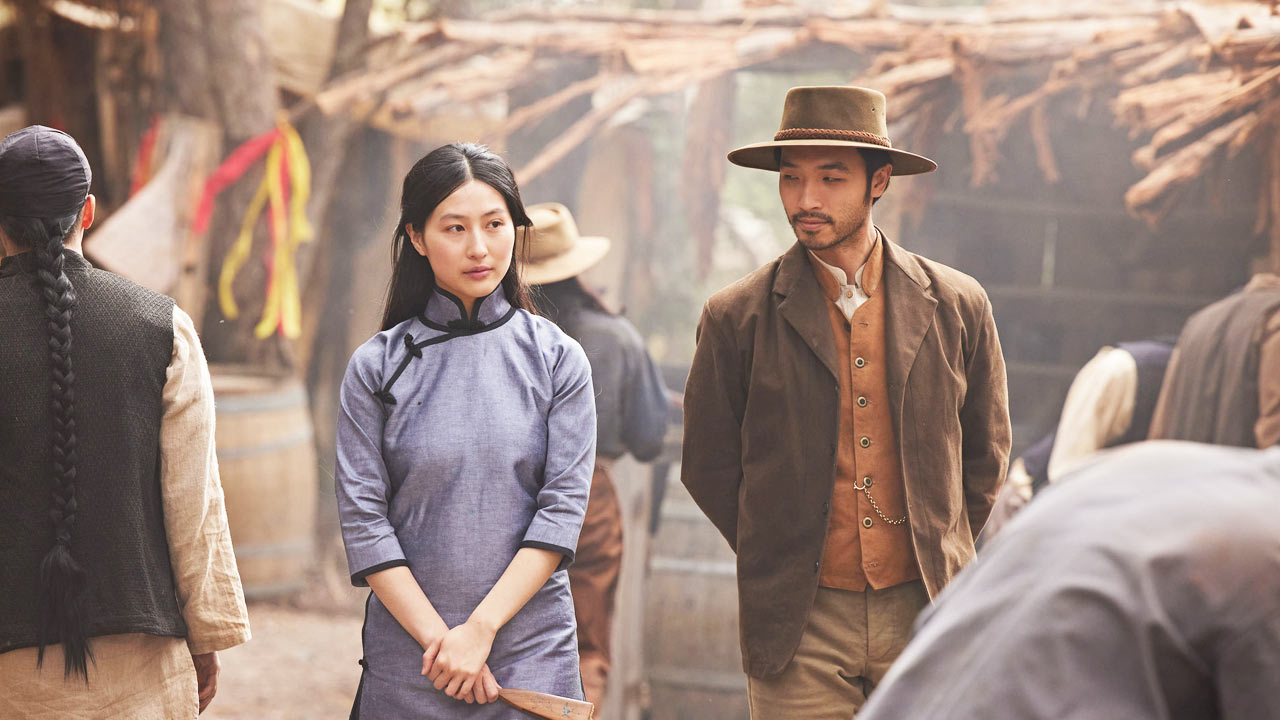New Gold Mountain is a riveting slice of Australian history, chock-full of greed and lust

Full of arresting images and beautiful period textures, Australian miniseries New Gold Mountain (premiering October 13 on SBS on Demand) uses a culturally diverse approach to tell a labyrinthine story set during the gold rushes, writes Glenn Dunks.
Despite what Australian film and television may suggest, Chinese immigrants to Australia were not just silent cooks on cattle stations. The history books are littered with compelling stories of business owners, agriculture labourers, interpreters, artists and farmers from pre- and post-federation immigration.
We can (and should) curse the practices that mean these stories have for too long been disregarded by our country’s screen culture. But also, what a relief it is now to see money and resources finally put into telling these culturally diverse narratives—and to do so with the richness, depth and talent (behind and in front of the camera) they deserve.
New Gold Mountain is a new four-part SBS miniseries that drops viewers into the world of Victoria’s gold rush in the 1850s. It’s a setting full of greed, murder, lust and betrayal that creator Peter Cox and director Corrie Chen (Homecoming Queens) utilise to its slow-burning dramatic potential.
Taking place predominantly within the Golden Point Mining Camp in 1857, Wei Shing (Yoson An) is the headman of the Chinese quarter who finds himself at a crossroads. There is the discovery of a white woman’s mutilated body and the ensuing investigation, with all eyes on the Chinese and Aboriginal populations. There are the racist police and a widowed newspaper owner (Alyssa Sutherland) who senses there’s more to everything than meets the eye. There is also the discovery of gold upon the arrival of his boss’ daughter (Mabel Li) from China. All while Wei Shing attempts to host a mid-Autumn festival (albeit in Spring) to bridge relationships between the Chinese and European mining camps.
New Gold Mountain unfolds delicately and with smart economy. While viewers may be more familiar with the eight-to-ten-episode arcs popularised on streaming services, SBS’s slimmer four-episode miniseries standard is refreshing and fast-paced. And despite its labyrinth of intersecting plot threads that sprawl across a small patch of Victoria’s central highlands, the series only rarely finds itself tangled.

While it doesn’t make it explicit, many of its themes and what it has to say about the treatment of immigrants by the ruling class clearly continues to ring true to this day. In one of the show’s subtlest writing tricks, its characters often swing fluently between English and Cantonese. This is just one of the ways Chen and her writers (which include Pip Karmel and Benjamin Law) emphasise the determined entrepreneurial spirit of migrants to this land for what is now well over 150 years.
In this, the series straddles a fine line between a desire to navigate the murkier moral dilemmas of idealistic pursuits amid the racist colonial mindset of a then-young nation, and its more audience-bound ambitions of being mainstream entertainment. Some may wish its strong influences from the western genre manifested itself more prominently in gunfights and chases on horseback, but I was thankful that it was less interested in the uglier, violent element of the Aussie bush than many of its meat pie brethren. While there is certainly some rotting teeth and fly-strewn blood, this is far from The Proposition or The Nightingale.
It is a lush production, filmed in and around the famed Sovereign Hill of Ballarat (a time-honoured destination for school excursions since 1970) by cinematographer Matthew Temple, who captures the dry landscape in some really arresting images. Elsewhere, it’s full of beautiful period textures, from the make-up work of Helen Magelaki to the lovingly manicured dust-blown costumes of Cappi Ireland. Caitlin Yeo’s divine music is also a treat—particularly her opening credits theme, which you won’t want to skip.
Yoson An—from the live-action remake of Disney’s Mulan—makes for a handsome and compelling leading man, too. He is a grounding force amid the series’ many competing, swirling narrative elements. Both in front of and behind the camera, New Gold Mountain is the sort of thing that AACTA Awards are made for.
Viewers with a penchant for the period works of Kelly Reichardt (First Cow and Meek’s Cutoff most predominantly) would definitely do well to ensure they seek out New Gold Mountain. But this isn’t just a niche arthouse project drawn out to four hours. It’s a riveting slice of history with grand ambitions, elegantly told.



















